Saturday morning. 6.40 am.
Birds are chirruping, the sun has got his hat on, the sky’s forget-me-not blue. Try as I might, I can’t pretend I’m sleeping.
I give up, get up and prepare for a weekend jaunt.
Queen Street Mill, the last 19th century mill in the world still weaving cotton on looms powered by steam, is working today. It’s in Burnley, Lancashire – and it opens at noon.
I print out a map, fire-up Ms SatNav.
‘Fast, short or ecological?’ she asks, all innocence.
In no hurry, we opt for short.

This is the bridge after which the district is named – it’s chiselled into the stone but, horrors, they spelt it Urnshaw
I soon begin to wonder if I accidentally selected ‘Tardis’, Dr Who’s time-travelling machine. Because not far into our journey we start heading for Earnshaw Bridge.
Earnshaw Bridge is a something-and-nothing kind of place. But if your family name happens to be Earnshaw, it becomes a point of honour to hunt it down. We did, some time ago. Don’t need to do that again.
We motor on by.
Find ourselves in the town made famous by Leyland motors. There I spy, with my little eye, a Commercial Vehicle Museum (don’t worry we’re not stopping).
In the yard stands a shiny, old-fashioned fire engine – from Blackburn.
I feel a tremor of nervous excitement. I lived in Blackburn till I was seven. Looks like we’re heading that way.
There’s a sign for Pleasington Priory – we used to go to Mass there, sometimes. I liked to play in the graves filled with green glass pebbles – and was threatened with a smack, when I got home.
Now we’re passing a sign to the cemetery where my mother buried my father’s ashes. In the wrong grave. (He didn’t want to be cremated, which puts that error into perspective.)
Oh no – here comes Cherry Tree.
Sounds harmless, I know. Pleasant even. But it’s a place I revisit in the dark hours of the night, feeling pangs of guilt after more than 20 years. I brought my mother here to view some sheltered accommodation the day before she went on holiday with a friend. It depressed her – ruined her holiday. Sigh.
On into Blackburn.
It’s changed hugely since we left. I’ve been back, but only to see our old house, avoiding the rest.
But little Ms SatNav doesn’t care a fig for my sensitivities. She takes us right through the centre.
As we roll along Barbara Castle Way (MP for Blackburn from 1945-1979) a small sign points left, uphill.
The school gave my father a life-changing scholarship – and a job as history master to compound it.
At last we pull up beside a fine stone building. A little steam seeps from a red brick chimney, joining puffy, scudding white clouds.
Tea and cake set us up for a long visit.
A siren wails – the steam engine’s powered up. The looms in the main weaving shed clack and clatter into life. Deafening.

The weaving shed – now only one third its original size – still operates as it did in 1894 when the mill first opened. It now has 300 Lancashire looms where once there were 1000. The looms are powered by the ‘Peace’ steam engine via the overhead line shafting
Two things strike me as we read, watch and listen.
One, the massive interdependency of industries that made a mill work.
In my native Blackburn, for example, as well as cotton mills, there were shuttle makers and manufacturers of machinery.
Wood, metal, coal were essential – as was water.
This mill’s atop a hill with no water source and relies on rain and run-off. Outside, the ‘lodge’, or reservoir, is today doing an impression of an impressionist painting.
Without water the engine can’t run, the weavers can’t weave, the master won’t pay.
John Ward, a Lancashire weaver, wrote in his diary on 28 August 1864: “There were 30 mills stopped this last week in Blackburn for want of water”.
Just imagine the hardship.
Which brings me to the second striking thing: these working people’s livelihoods hung by a thread as slender as the cotton they wove.
Graeme, our guide and expert weaver, tells us how women weavers – each tending several looms – looked out for each other. They were all ‘aunties’ who’d help out in times of trouble, tending others’ children, covering for ‘bathroom’ visits.
I travel back in time, again, to Blackburn, counting aunties. I had two real aunts, Edith and Madge. Madge frightened me – the only time I recall meeting her was in her house, a place my memory paints darkly.
I had cheerier aunties in Nell, Tisbeth, Irene, Dorothy, Barbara – a dozen at least.
Auntie Barbara lived next door.
One day, a friend who had that most enviable of playthings, a swing, said I could play in her garden when she was out.
My friend’s father had an aviary. The aviary door was open. I stepped in and the door shut.
I couldn’t get out.
I wailed, cried, called for my mummy.
Auntie Barbara came and let me out.
Long after we moved across the Pennines, when I was between school and university, I worked as a ‘relief assistant housemother’ in children’s homes. The children called me, 18-year-old me, auntie.
But I digress. Queen Street Mill made me realise what a sense of community we’ve lost with our fences and gates, blinds and locks.
We need our heritage, it tells us things.
Which is why Queen Street Mill is a ‘Grade 1’ (top grade) listed building.
Lancashire cotton kept the bread on Britain’s tables.
Between 7 and 8.30 am, it was said, its weavers made fabric for domestic consumption, the rest of the day it satisfied the world’s needs.
It was, arguably, the engine of the nation.
This mill’s the last working 19th century cotton mill in the world powered by a steam engine.
And it’s due to close in September.
Our Government has savaged Lancashire County Council’s budget. The five museums closing are just the tip of an iceberg. The savings from closing them are reported to be £1.13 million in 2017-18.
Yet, hundreds of miles away, the new London Mayor presses ahead with plans for an unnecessary garden bridge, requiring £60 million of taxpayers’ money, plus £3.5 million for annual maintenance.
And the industrial north?
Well, we’ve been promised a Northern Powerhouse. And I really believe it’ll happen.
Yeah. And pigs might fly.
Get me out of here, Ms SatNav.
Fastest route.
I’ll be putting more pictures and information about the mill itself on my Maid in Britain blog site. I got a bit angry after we went to the other mill museum threatened with closure – if you fancy reading that post again it’s here: Helmshore Mills
If you’d like to sign a petition to try and keep them open please do sign this one:
http://www.pendleheritage.co.uk/save-queen-street-mill-and-helmshore-mills-sign-petition-here/
And if you know a millionaire philanthropist with a soft spot for industrial history, please pass this on 😉

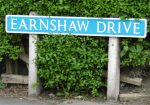



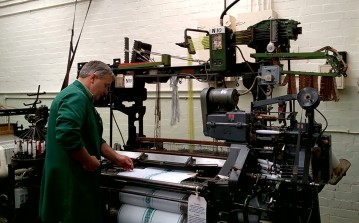

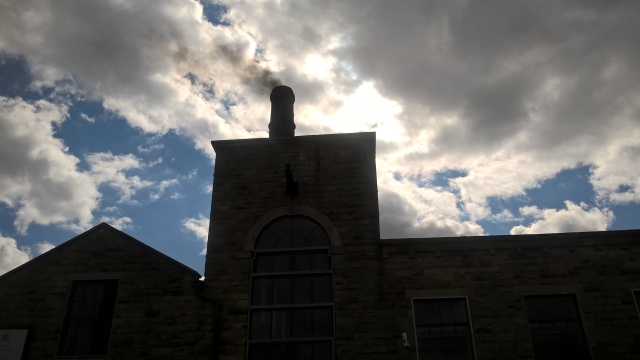
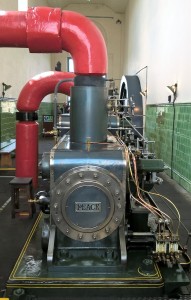

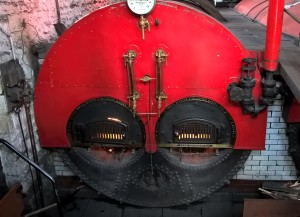

Actually even more appropriate part of our own family was intimately involved as aunty Nelly and uncle George ,her husband were both workers in the mill . Am ashamed to say that I didn’t like visiting them as they were not like us , Nelly wore clogs and curlers and had no teeth and she was the power in the house !
LikeLike
I’ve never heard of them! I thought ‘Auntie Nellie’ was just a generic name for aunties of that era! I have a friend from college who was disturbed at one of her aunts because of her false teeth but not no teeth! She lived in Blackpool. Just think what a tough life it was for them – no electric or gas stoves, no central heating, no washing machines, no birth control and working in ‘tmill too. x
LikeLike
I enjoyed your reminisences of home. Am I correct in assuming that Queen Street Mill is a government-supported historical working museum? Do they produce fabrics for sale? Loved your photos.
Thel
LikeLike
Hiya Thel. The mill is a working museum, yes, been working since 1894. It is a keystone of the country’s heritage – King Cotton ruled the world from Lancashire. I meant to put a map in but forgot. I’m going to do a more industrial blog for my other site which will bring in the drastic effect of the American civil war on the earlier Lancashire cotton industry. It’s supported by Lancashire County Council, along with the other mills I wrote about in ‘Not even a pot to piss in’. Lancashire’s funding from our central government has been cut dramatically and they can no longer afford to keep them going, nor women’s refuges, libraries, etc etc. The cuts have been worst in the areas that need the money most so one has to assume this is for political reasons (angry face). Anyway, yes, they produce textiles, fabric by the yard as well as items for sale in the gift shop… A few people may be getting tea towels next Christmas! (Not you, I think the sheep were enough!).
And, thank you.
Lou x
LikeLike
Today’s Saturday morning music selection was Joni Mitchell… no matter how many times I listen to Big Yellow Taxi the words resonate, and chill me.
They took all the _________
And put them in a _____ museum.
She wrote it in 1970.
Now They are closing all the museums.
LikeLike
Happy Saturday, Dale. You’ve inspired me, I’m going to go and put Court and Spark on. I LOVE Joni Mitchell. Carey is one of my favourites. And Big Yellow Taxi of course. And all of Blue – ‘I could drink a case of you and still I’d be on my feet’ and the Richard song, ‘I’m gonna blow that damn candle out, don’t want no-one coming over to my table,. got nothing to talk to anybody about’ – oh dear, I think I’m being a bit revealing! Anyway, yes, I hear those words, ‘pave paradise, put up a parking lot’ when I’m out and about, sadly all too relevant all too often. I don’t know what it would take to get those in the London bubble to realise what we’re losing – maybe it IS a conspiracy to destroy working class heritage!! No, I don’t mean it. Thanks as always for an apt comment…
LikeLiked by 1 person
hey there this is awesome. i love fabrics and i am looking for those semi-automatic Lancashire loom to buy. Any idea where and how to find? thanks best tim
LikeLike
Sorry Tim I have no idea except that they are currently are looked after by Lancashire County Council.
LikeLike